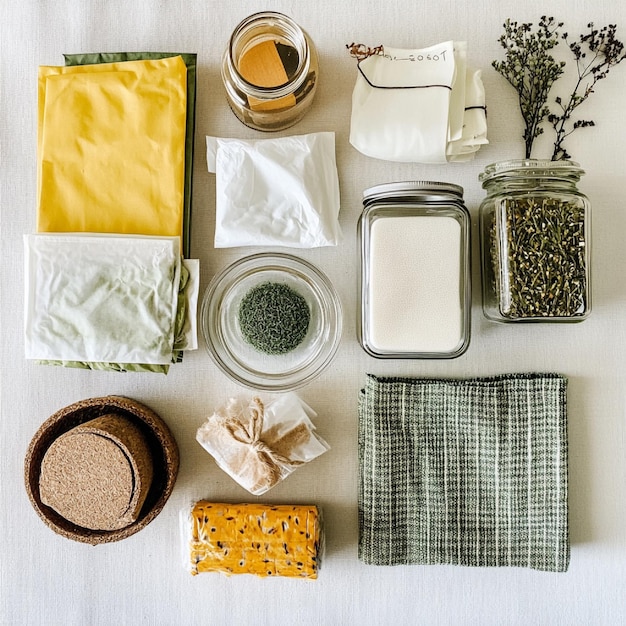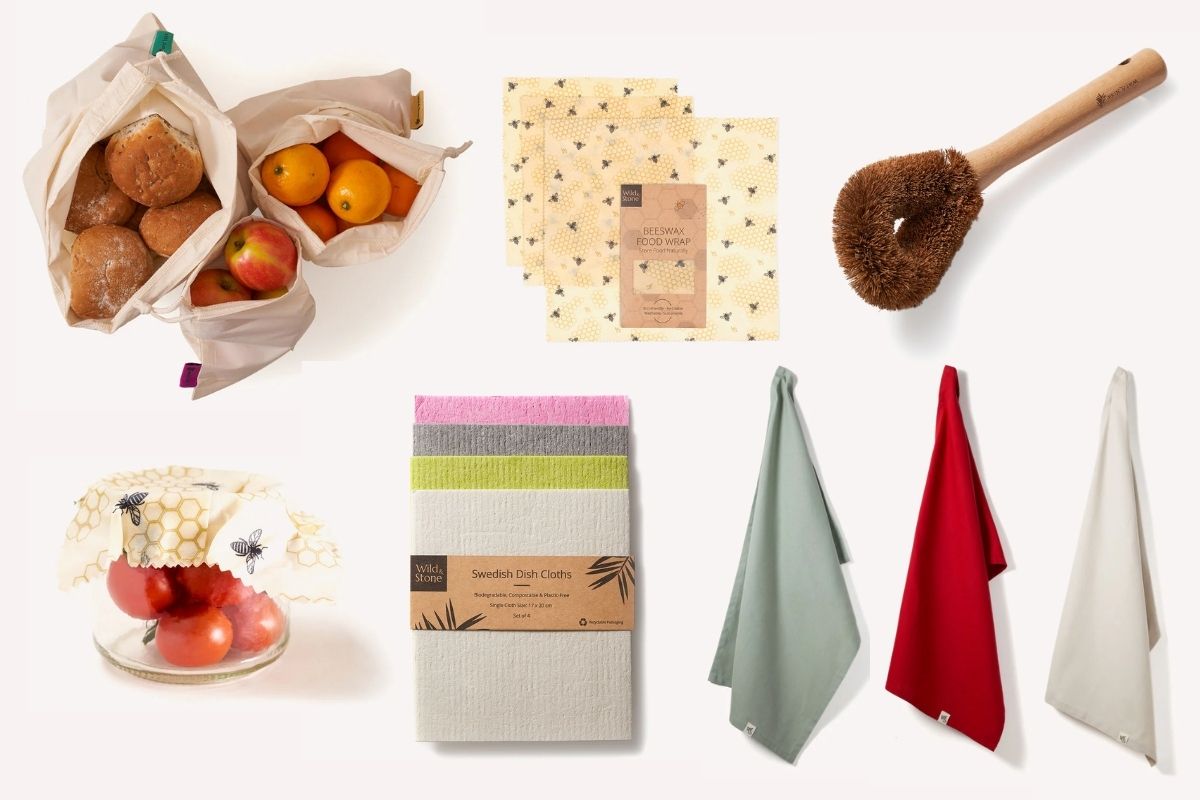
Ditch the Disposables: 5 Simple Swaps for a Zero-Waste Kitchen
[ ]
]
Does your kitchen trash can seem to fill up faster than you can blink? Between single-use plastics, paper towels, and food packaging, it's easy to feel overwhelmed by the amount of waste we generate in our kitchens. The impact on our planet is undeniable: overflowing landfills, polluted oceans, and a constant drain on precious resources. But what if you could create a kitchen that's kinder to the environment, easier on your wallet, and healthier for your home? It's more achievable than you might think!
In this post, we'll explore 5 simple swaps that can help you transform your kitchen into a haven of sustainability. We're not aiming for perfection – zero waste is a lofty goal, especially at the start. Instead, we'll focus on making conscious choices to reduce waste, embrace reusable alternatives, and create a more sustainable and cozy living space. Let's dive in and discover how easy it is to ditch the disposables and create a zero-waste (or low-waste) kitchen!
1. Swap Paper Towels for Reusable Cloths
[ ]
]
Think about how many paper towels you use in a single day. Drying hands, wiping spills, cleaning countertops... the list goes on. All that paper adds up! The environmental cost of paper towels is significant, from deforestation and energy-intensive manufacturing to the mountains of waste they create.
Luckily, there's a simple and effective alternative: reusable cloths. Embrace the farmhouse life by making use of what you have! Keep a stack of soft cloths readily available for drying hands, heavier cloths for general cleaning, and maybe even microfiber cloths for polishing. You can even create DIY cloth wipes with natural cleaning solutions - just add a touch of essential oils!
Actionable Tip: Start with 10-12 reusable cloths and keep them in a convenient location. Have a designated hamper or container for soiled cloths. If you have old t-shirts, simply cut them into squares and hem the edges. Voila! Instant cleaning cloths! Launder used cloths regularly with your other linens to ensure hygiene.
Takeaway: Reusable cloths are an easy, cost-effective, and eco-friendly alternative to paper towels that will transform your cozy kitchen!
Keywords: reusable cloths, zero-waste kitchen, sustainable home, cleaning tips, diy wipes
2. Replace Plastic Wrap with Beeswax Wraps (or Silicone Lids)
Plastic wrap is a kitchen staple for many, but its environmental impact is undeniable. It's non-biodegradable, contributing to landfill waste for centuries. Worse, some types of plastic wrap can leach chemicals into food, potentially posing health risks.
Beeswax wraps offer a natural and reusable solution. Made from cotton fabric coated with beeswax, resin, and oil, these wraps mold to the shape of bowls, containers, and food items, creating a tight seal to keep food fresh. They're washable, reusable, and even compostable at the end of their lifespan.
Actionable Tip: Make your own beeswax wraps using fabric scraps and beeswax pellets (easily found online or at craft stores).
Here's a simple recipe:
- Cotton fabric scraps (cut to desired sizes)
- 1/4 cup beeswax pellets
- 1 tablespoon pine resin
- 1 teaspoon jojoba oil
Melt ingredients together in a double boiler. Dip fabric into the mixture, spread evenly, and let dry. Once cool, they are ready to use.
Takeaway: Beeswax wraps eliminate single-use plastic wrap, keeping food fresh while minimizing waste. It makes food look even tastier!
Keywords: beeswax wraps, plastic wrap alternative, diy, zero-waste kitchen, sustainable home, compostable, food storage
3. Trade Plastic Bags for Reusable Produce Bags & Grocery Bags
Plastic bags are a major source of pollution, often ending up in waterways and harming wildlife. From urban homesteading to rural farmhouse life, we all share a need to reduce plastic use. Switching to reusable produce bags and grocery bags is an easy way to significantly reduce your plastic consumption.
Invest in a set of reusable produce bags made from mesh or organic cotton. These bags keep your produce fresher for longer and eliminate the need for those flimsy plastic bags at the grocery store. And of course, remember to bring your own reusable grocery bags for all your shopping trips, not just to the supermarket!
Actionable Tip: Keep a set of reusable grocery bags and produce bags in your car (or by the door) so you're always prepared. Even better, you can sew your own bags using old curtains or pillowcases. Start small and you will see that soon you will be on your way to a sustainable home.
Takeaway: Reusable bags are a simple and stylish way to reduce plastic waste at the grocery store and reduce the carbon footprint!
Keywords: reusable grocery bags, reusable produce bags, plastic bag ban, zero-waste kitchen, sustainable home, sewing project
4. Compost Food Scraps (Even in a Small Space!)
Did you know that food waste is a major contributor to greenhouse gas emissions in landfills? Composting is a fantastic way to reduce food waste and create valuable soil amendment for your garden. Whether you have a sprawling backyard or a small urban balcony, there's a composting method that will work for you.
Outdoor compost bins are ideal for larger volumes of food waste and yard waste. Vermicomposting (worm composting) is a great option for small spaces, using worms to break down food scraps. Even Bokashi composting, an anaerobic method using bran, can be done indoors.
Actionable Tip: Start with a small kitchen compost bin and empty it regularly into a larger compost pile or vermicomposting system. If you don't have a garden, donate your compost to a local community garden. It's a win-win!
Takeaway: Composting transforms food waste into nutrient-rich soil, reducing landfill waste and enriching your garden, supporting the goals of regenerative agriculture.
Keywords: compost, composting, food waste, zero-waste kitchen, vermicomposting, bokashi, sustainable home, soil health
5. Switch to Solid Dish Soap & Bamboo Scrub Brushes
[ ]
]
Liquid dish soap often comes in plastic bottles that end up in landfills. Solid dish soap offers a plastic-free alternative that's just as effective at cleaning dishes. Simply rub a wet sponge or brush against the solid soap to create a lather.
Pair your solid dish soap with a bamboo scrub brush for a completely plastic-free dishwashing experience. Bamboo is a sustainable and biodegradable material, making it an eco-friendly choice.
Actionable Tip: Purchase a solid dish soap bar from a local shop or online retailer. Or, try making your own using castile soap and essential oils.
Takeaway: Solid dish soap and bamboo brushes are effective and eco-friendly alternatives to conventional dishwashing products and will make you cozy living even easier.
Keywords: solid dish soap, bamboo scrub brush, plastic-free dish soap, zero-waste kitchen, sustainable home, diy dish soap
Embrace the Journey
Transitioning to a zero-waste kitchen is a journey, not a destination. Don't get discouraged if you don't make all these changes overnight. Celebrate small victories and focus on making gradual, sustainable changes that fit your lifestyle.
As you plan your seasonal harvest, consider how you can reduce food waste by preserving your bounty, using every part of the plant, or composting scraps. By embracing these simple swaps, you'll not only reduce your environmental impact but also create a healthier and more sustainable home. Plus, you may even save money in the long run!
What are your favorite zero-waste kitchen swaps? Share your tips and experiences in the comments below! Let's build a community of like-minded individuals striving for a more sustainable future, one kitchen at a time!